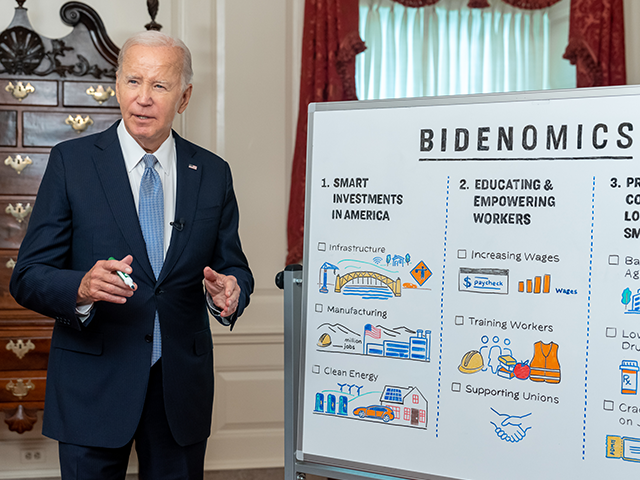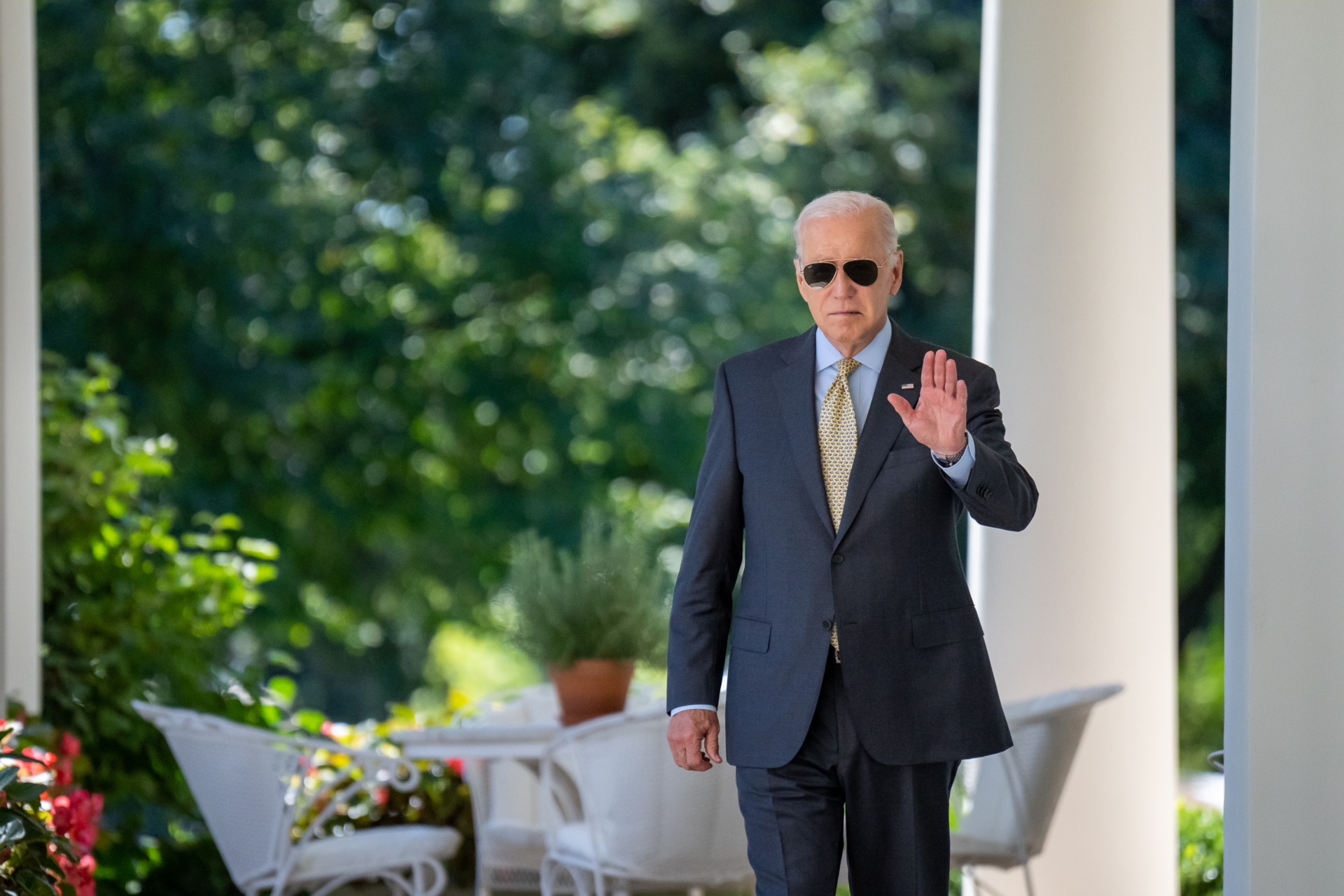Breitbart Business Digest: Why The Public Doesn't Trust Biden on Inflation
 Adam Schultz/White House via Flickr
Adam Schultz/White House via Flickr
Biden's Struggle with Inflation and Public Opinion
Why is the public so unhappy with President Joe Biden's economic leadership?
Maybe because many Americans quite reasonably sense that Biden and his allies are not really all that interested in addressing the most pressing economic problem faced by Americans: inflation.
Every survey shows the public is deeply dissatisfied with Biden's economic leadership. The most recent Gallup poll, for example, found that just 38 percent of Americans express a great deal or a fair amount of confidence that the president will do or recommend the right thing for the economy.
The most recent YouGov/Economist poll found that just 38 percent of the public say they approve of the job Biden has done on the economy, with just 18 percent strongly approving. A 52 percent majority say they disapprove of Biden's handling of the economy, including 39 percent who strongly disapprove.
These are the kind of confidence and approval levels that one would expect in an economy deep in recession.
“Only Bush earned lower confidence from Americans than Biden has since last year — by the end of his second term, amid the Great Recession, when just 34% of Americans expressed confidence in his economic abilities,” Gallup points out in its analysis.
The Rose-Colored Glasses of Progressive Pundits
The progressive pundits have themselves in a lather over these polls. They regard them as irrational and insist that Biden's economy is much better than the public is willing to credit. To back this up, they point to the fact that we avoided a recession, unemployment remains low, real income growth is positive over Biden's presidency, the stock market is booming, and economic growth has been strong.
“By normal measures, however, the U.S. economy isn’t in bad shape. In fact, it’s doing quite well, better than almost all its global peers,” Paul Krugman recently claimed.

President Joe Biden meets with New York Times columnist and economist Paul Krugman on August 14, 2023, in the Oval Office. (Adam Schultz/White House via Flickr)
There's plenty to argue against in this rosy view of the economy. Unemployment is low, but it was lower while Trump was president. Real incomes are up during Biden's presidency, but barely so. Income growth has not only lagged what Americans saw under Trump, it has lagged historical averages. The economy has been growing and the stock market rising, but household net worth has lagged behind the Trump administration's pace of growth. Adjusted for inflation, household net worth increased just 0.7 percent through Biden's first three years, compared with 16 percent through Trump's first three years.
As everyone should know by now, inflation is the specter haunting the Biden administration. Seventy-four percent of the public rank inflation as “very important,” according to the Economist/YouGov poll. The issue of “jobs and the economy” ranks second at 69 percent, with almost everything else distantly trailing. When asked which is the most important issue facing the country, 25 percent say inflation, putting it ahead of every other issue by a wide margin. Jobs and the economy is second at 12 percent, followed by immigration at 10 percent.
Yet if you direct your attention at the progressive establishment's opinion organs, there's still an incredible denial of this basic fact. Slate, for example, recently ran a piece entitled “Inflation is not destroying Joe Biden.” If you get beyond the very weird discussion of whether or not Biden's economy is as bad as Jimmy Carter's and the now-familiar complaints that Americans are just delusional about the economy, you find the even stranger claim that the problem cannot be inflation because inflation is “functionally over.”
Inflation is not over, functionally or otherwise. In the first quarter of this year, inflation surged. The personal consumption expenditure (PCE) price index, the Fed's favored barometer, rose at a 3.2 percent rate, and core PCE inflation rose at a 3.6 percent rate. These measures were growing at two percent or less at the end of last year, meaning the public has witnessed an acceleration of inflation in recent months.
Not surprisingly, the persistence of inflation and its recent resurgence is giving rise to doubts about the ability of our government to bring it under control. The New York Fed's consumer survey showed that five-year inflation expectations rose to the three percent high hit back in early 2021 and the summer of 2022. While one-year inflation expectations ticked down a bit, from 3.3 percent to 3.2 percent, they're still far above the 2.5 percent that prevailed at the end of 2019.
Trapped by Progressive Democrat Extremism
You might expect an administration determined to be re-elected to develop policies that had a serious chance of bringing down inflation. Yet at every turn Biden can be seen promoting policies that would make inflation worse, including student loan “forgiveness,” subsidies for home-buyers, green energy mandates, and migration-magnet programs that drive up demand for consumer goods and housing. His preferred reaction to inflation is to attack corporate greed and complain that candy bar sizes are getting smaller and ice-cream cone prices are getting higher.
One reason for this may be the leftward lurch of Democrats over the past twenty years. Gallup polling shows that in 2004, 26 percent of Democrats described themselves as conservative or very conservative on economic issues. This slipped to 21 percent by 2014. But in this year's poll, it has crashed to five percent. The fraction describing themselves as moderate was 44 percent in 2004 and is 44 percent now. But the share saying they are liberal or very liberal has jumped from 28 percent to 49 percent.

President Joe Biden on September 1, 2023, in the Rose Garden of the White House. (Adam Schultz/White House via Flickr)
As a result, Biden would have to throw over half of his party to adopt even moderate policies aimed at reducing inflation. If he were to try to adopt a conservative pro-growth agenda that would attempt to ameliorate inflation by increasing the supply side of the economy, he'd find himself almost completely without support from his own party. Where it was once possible to put together a coalition of Democrat conservatives and moderates to support policies, now both those groups barely equal the leftwing rump who almost certainly make up most of the activists and vocal supporters.
Polling shows us that large factions of Biden's supporters are telling him that he's done a fine job on inflation and the economy. The Economist/YouGov poll shows that 73 percent of Biden voters approve of the job he's done on inflation, as do 59 percent of self-described liberals and 67 percent of Democrats. Thirty percent of Biden voters in the last election say they “strongly approve” of Biden's efforts on inflation, along with 28 percent of liberals and 29 percent of Democrats.
Compare that to the public as a whole, where Biden gets just a 32 percent approval rating on inflation. Self-described moderates give Biden a 34 percent approval rating. Just 19 percent of independent voters say they approve of Biden on inflation.
Biden's economic mismanagement is very likely rooted in this disconnect between public opinion and the increasingly partisan and extreme views of his party's leftwing plurality. They insist that inflation is not really that bad, it's already over, and Biden's done a fine job with it anyway.
Given this political dynamic, it's no wonder Americans expect inflation to keep going and have little confidence Biden will do anything to tame it.
Source link

